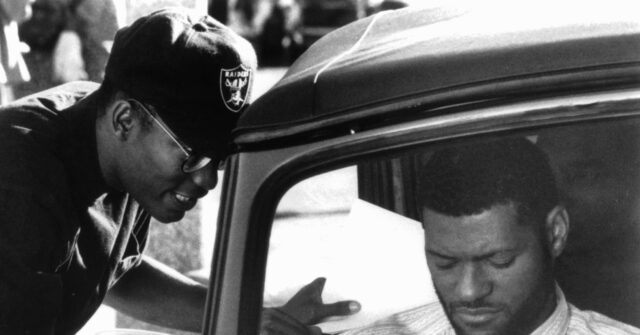In a recent appearance on “The Joe Rogan Experience,” Republican vice presidential nominee Sen. JD Vance emphasized the messages in the 1991 film “Boyz n the Hood” directed by John Singleton, particularly in relation to education and perceived biases within it. Vance reflected on his own upbringing in a white working-class neighborhood, where he also experienced poverty, enabling him to connect with the film’s narrative. He stressed that the film’s character, Jason “Furious” Styles, portrayed by Laurence Fishburne, delivers a powerful lesson that “math is not racist.” This assertion, according to Vance, serves as a crucial reminder for liberals to recognize that mathematics is an objective discipline, free from cultural bias, and represents a pathway to achievement for all students, regardless of race.
Vance’s admiration for the character of Furious Styles stems from Styles’ determination to prevent his son from falling into a life of violence, reflecting the fatherly guidance that Vance himself lacked during his formative years. Vance noted that Styles’ struggle against large financial institutions that threaten to dominate local real estate resonates with his own experiences growing up in an economically challenged area. The film’s nuanced conversations about structural inequalities and parental responsibilities deeply influenced his understanding of societal challenges, prompting him to critique contemporary narratives around education and race.
Vance underscored that the film communicates a significant message regarding education: while there is recognition of biases in college aptitude tests, the fundamental tenet that mathematics is universally applicable remains. He pointed out that the essence of educational achievement lies in embracing academic rigor rather than diluting standards to make them more broadly accessible. Vance articulated his frustration with current educational policies in liberal states that tend to prioritize equity over excellence, advocating for a return to the belief that hard work and a focus on subjects like math can empower all students—especially those from disadvantaged backgrounds.
The discussion around equity in mathematics education is controversial, with many educators and policymakers arguing that the move away from traditional high-achievement metrics may ultimately hinder growth and achievement among students. Vance’s commentary resonates with critics of this approach who argue that lowering educational standards is counterproductive and perpetuates cycles of dependency rather than fostering independence and self-improvement. By advocating for higher standards, Vance aligns himself with a philosophy that views education as a critical tool for empowerment, suggesting that embracing rigorous academic disciplines can bridge socioeconomic divides.
The clarity of Vance’s position reflects a broader ideological divide within American politics regarding education, race, and socioeconomic mobility. His references to “old-school black leftism” highlight an inherent tension between traditional progressive narratives and the recent shifts towards equity-centric educational policies. In an era where discussions about race and achievement often spark heated debates, Vance’s call for a return to the fundamentals of education challenges the notion that changing academic standards can create true equity. Instead, he posits that children, particularly in low-income communities, can benefit significantly from rigorous educational frameworks that emphasize measurable outcomes and personal responsibility.
As the conversations around these subjects continue, the implications of Vance’s comments extend beyond the confines of a single podcast episode. His remarks contribute to the ongoing discourse about how best to educate a diverse population while fostering achievement and accountability. With the backdrop of the upcoming elections, educational policy has become a pivotal issue, with candidates positioning their platforms in alignment with the beliefs of their constituents. In this context, Vance’s assertions about math, race, and educational performance reflect not only a personal narrative shaped by his experiences but also a larger ideological battle that will influence the political landscape in the coming years.

